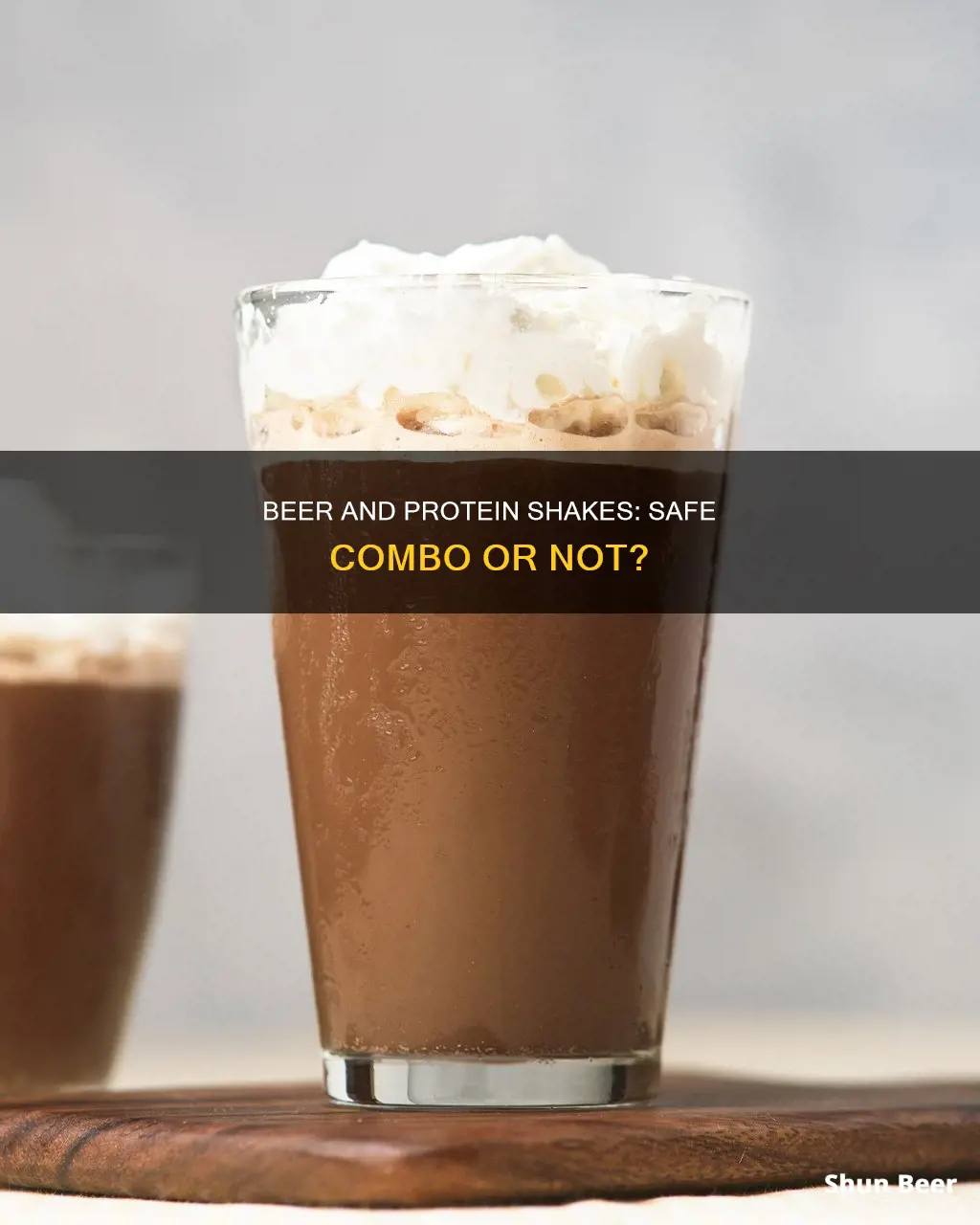
Drinking beer after consuming a protein shake is a topic of interest for many fitness enthusiasts, especially those who enjoy an alcoholic beverage after a workout. While some sources suggest that drinking alcohol can negatively impact muscle recovery and fat-burning processes, others claim that moderate beer consumption can offer benefits such as nutrients, antioxidants, and stress reduction. The key lies in moderation, as excessive drinking can lead to weight gain and disrupt muscle protein synthesis. Ultimately, the decision to drink beer after a protein shake depends on individual preferences and fitness goals, but it's important to remember that light to moderate drinking is unlikely to have negative effects on the body.
| Characteristics | Values |
|---|---|
| Drinking beer after a protein shake | It is not recommended as it negatively impacts the body's repair process and adaptation to training. |
| Drinking beer after a workout | It is not recommended as it may hinder muscle protein synthesis and muscle growth. |
| Drinking beer in general | Excessive drinking may lead to weight gain and other health issues. |
| Recommended time between a workout and drinking beer | At least one hour. |
| Beer as a recovery drink | Beer contains nutrients such as selenium, B vitamins, phosphorus, niacin, protein, fibre, and silicon. |
What You'll Learn
- Drinking beer after a protein shake may negatively impact the body's repair process and adaptation to training
- Alcohol is considered a toxin by the body and can slow down muscle-building and fat-burning
- Beer is rich in nutrients like selenium, B vitamins, phosphorus, and niacin, which can be beneficial post-workout
- Excessive drinking can lead to weight gain, negatively impact muscle-building, and cause dehydration
- Light to moderate drinking, such as less than 7 drinks per week for women and less than 14 for men, does not seem to have negative effects

Drinking beer after a protein shake may negatively impact the body's repair process and adaptation to training
The human body treats alcohol as a toxin, and in the rush to be rid of it, muscle-building and fat-burning may be put on hold. Alcohol can cause a decrease in testosterone levels and an increase in cortisol levels, indicating a disturbance in the anabolic-catabolic balance, which can lead to decreased recovery and performance. Alcohol also suppresses the phosphorylation and activation of the mTOR pathways, the crucial kinase cascade regulating translation initiation. Additionally, alcohol increases the expression of muscle-specific enzymes that are up-regulated by conditions that promote skeletal muscle atrophy.
Furthermore, alcohol acts as a diuretic, promoting dehydration, and can interfere with the body's ability to rehydrate and replace fluids lost through sweat after exercise. Alcohol also has a negative impact on sleep length and quality, which is crucial for the body's recovery process.
While the impact of alcohol consumption on the body's repair process and adaptation to training is complex and depends on various factors such as the amount and timing of alcohol intake, the existing research suggests that drinking beer after a protein shake may have negative effects on the body's ability to repair and adapt to training.
Mixed Drinks vs Beer: Which is the Superior Beverage?
You may want to see also

Alcohol is considered a toxin by the body and can slow down muscle-building and fat-burning
Alcohol is considered a toxin by the human body. Consuming it can slow down muscle-building and fat-burning processes, which are essential for fitness enthusiasts and athletes. Here's how:
Alcohol is a Toxin
The human body treats alcohol as a toxin, and in the rush to get rid of it, other processes such as muscle-building and fat-burning may be put on hold. This is because the body's priority becomes metabolising ethanol, an extremely toxic byproduct of alcohol, into less harmful substances that can be used for energy.
Muscle-Building is Disrupted
Alcohol inhibits muscle-building, or protein synthesis, in multiple ways. Firstly, it disrupts the signalling pathways that tell the body to build muscle. Secondly, it reduces insulin resistance, which is a stimulator of muscle growth. Alcohol also induces insulin resistance, impairing muscle growth and recovery by limiting the absorption of carbohydrates into muscles.
Research has shown that consuming alcohol after a workout can negatively impact the body's repair process and adaptation to training. For example, a 2014 study found that athletes who consumed six vodka and orange juice cocktails over three hours after a workout experienced a 37% drop in their rates of protein synthesis.
Fat-Burning is Slowed
Alcohol reduces our ability to burn fat. This is because the body responds differently to alcohol than it does to food. The body sees alcohol as a toxin, so it prioritises removing it as waste instead of storing alcohol calories like food calories. This shift in metabolism slows down the natural process of burning fat stores.
Additionally, alcohol is converted into acetyl-CoA, which can be used to form triglycerides, or fat. This further contributes to fat gain instead of fat reduction.
Overall Impact on Fitness
The effects of alcohol on muscle-building and fat-burning can have a significant impact on fitness levels. Alcohol also inhibits nutrient absorption, disrupts sleep, and affects hormone levels, all of which can negatively impact overall fitness and performance.
While moderate alcohol consumption may not completely reverse your fitness gains, it is clear that alcohol does not positively contribute to fitness goals. For those looking to optimise their physical performance, avoiding alcohol altogether or drinking in strict moderation may be the best approach.
Drinking and Driving: One Beer, Big Trouble
You may want to see also

Beer is rich in nutrients like selenium, B vitamins, phosphorus, and niacin, which can be beneficial post-workout
Beer has existed for thousands of years and is considered a fairly nutritious beverage. Beer contains selenium, B vitamins, phosphorus, and niacin, which can be beneficial post-workout.
B vitamins are essential water-soluble nutrients that need to be consumed and replaced daily for people to stay healthy. B-complex vitamins help the body make energy when food is consumed and can help prevent a variety of diseases. They are also well known for their role in helping maintain red blood cells and keeping the nervous system healthy. Selenium is another antioxidant found in beer, which can help thwart the effects of osteoporosis. Phosphorus is also found in beer, and it is a standard 12-ounce can of beer that will be high in this mineral.
However, it is important to note that the human body treats alcohol as a toxin, and in the rush to get rid of it, muscle-building and fat-burning may be put on hold. Alcohol can also hinder muscle growth and recovery, and it is more effective to rehydrate by drinking non-alcoholic beverages.
While beer may have some beneficial nutrients, it is not a good source of nutrients compared to whole foods like fruits and vegetables. The effects of alcohol on the body post-exercise are complex and vary widely depending on how much is consumed and when. If the goal of exercising is to lose weight, drinking alcohol can stymie that process.
Beer and Sawan Month: A Spiritual Conundrum?
You may want to see also

Excessive drinking can lead to weight gain, negatively impact muscle-building, and cause dehydration
Drinking beer after a protein shake can be a common practice for some, especially after a workout. However, it is important to understand the implications of excessive drinking, which can lead to several negative consequences, including weight gain, impaired muscle-building, and dehydration.
Excessive alcohol consumption can lead to weight gain through multiple mechanisms. Firstly, alcohol is high in kilojoules, providing 7 calories per gram. Secondly, it interferes with the body's ability to burn fat. The body prioritizes metabolizing alcohol, causing a temporary halt in fat processing, which leads to fat storage, particularly around the abdomen. Thirdly, alcohol can increase feelings of hunger and lead to cravings for salty and greasy foods, resulting in excess calorie intake.
Excessive drinking can also negatively impact muscle-building. Alcohol inhibits protein synthesis, disrupts signaling pathways that tell the body to build muscle, and reduces insulin resistance, a stimulator of muscle growth. Additionally, alcohol affects testosterone levels, decreasing testosterone production and altering other reproductive hormones. These hormonal changes can impair muscle growth and recovery.
Dehydration is another consequence of excessive alcohol consumption. Alcohol acts as a diuretic, increasing urination and promoting fluid loss. The body typically eliminates more fluid than the amount consumed, leading to dehydration. This effect is more pronounced with drinks containing higher concentrations of alcohol.
While moderate drinking may not cause significant harm, excessive drinking can have detrimental effects on weight management, muscle-building, and hydration status. It is important to monitor alcohol consumption and prioritize a balanced diet and proper hydration, especially when focusing on health and fitness goals.
Beer and Vitamins: Can They Mix?
You may want to see also

Light to moderate drinking, such as less than 7 drinks per week for women and less than 14 for men, does not seem to have negative effects
Drinking beer after a protein shake is not recommended, as alcohol can negatively impact muscle recovery and fat-burning processes. However, light to moderate drinking—defined as consuming less than 7 drinks per week for women and less than 14 drinks per week for men—does not seem to have significant negative effects on health.
Light to moderate drinking is generally not considered harmful and may even offer some potential benefits when compared to heavier drinking or abstinence. For example, a study by New Zealand's Massey University found that consuming approximately two drinks for a person weighing 150 pounds was unlikely to impact recovery significantly. This amount translates to less than 7 drinks per week for women and less than 14 drinks per week for men, on average.
It is important to note that the definition of light to moderate drinking varies across different health organizations and countries. The National Institute on Alcohol Abuse and Alcoholism (NIAAA) defines moderate drinking as no more than 2 drinks per day for men and 1 drink per day for women. Binge drinking, which is associated with higher risks, is defined as consuming 5 or more drinks for men or 4 or more drinks for women in about 2 hours.
While light to moderate drinking may not have severe negative effects, it is still essential to consider the potential risks associated with alcohol consumption. Alcohol is high in empty calories, which can hinder weight loss efforts. Additionally, it can disrupt sleep and affect cognitive function, leading to poor decision-making. Certain individuals, such as those with specific medical conditions, taking certain medications, or who are pregnant, should avoid alcohol completely.
In conclusion, while light to moderate drinking is not considered harmful, it is always advisable to consume alcohol in moderation and be mindful of potential risks. For those focused on health and fitness goals, prioritizing recovery, hydration, and a well-balanced diet is crucial.
Thermal Beer Mugs: How Do They Keep Drinks Cold?
You may want to see also
Frequently asked questions
Yes, you can. However, it is important to note that alcohol may negatively impact the body's repair process and adaptation to training.
It is recommended that you wait at least 30 minutes, also known as the "anabolic window", to maximize the results of your protein shake.
Yes, it may. Studies have shown that alcohol can disrupt muscle protein synthesis and muscle growth. However, this effect varies depending on the amount of alcohol consumed.
Beer contains nutrients such as selenium, B vitamins, phosphorus, and niacin, which can be beneficial for the body after a workout. Beer has also been linked to stress reduction and muscle upkeep.







